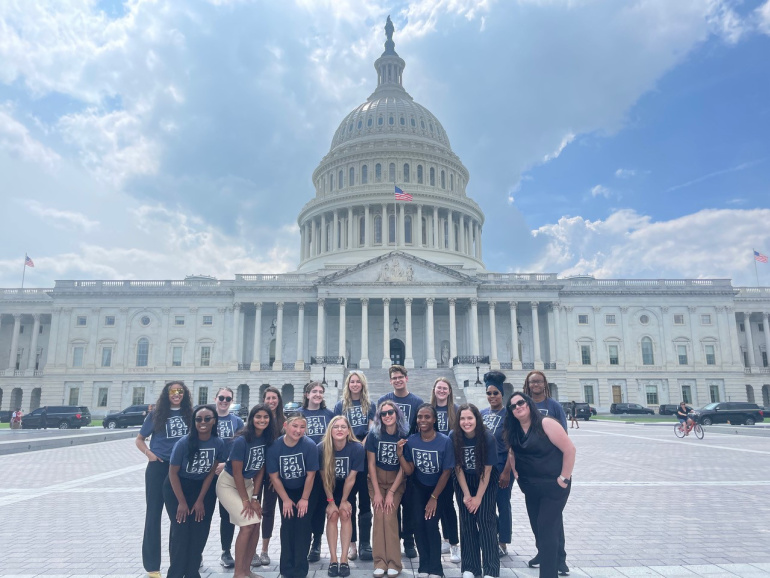
Wayne State’s Science Policy Network-Detroit — known as SciPol-Detroit — recently completed their second annual trip to Washington, D.C., to advocate for federal science funding and science-based policies.
A group of 18 students and scientists met with the offices of 10 lawmakers on Capitol Hill. The students advocated for the Environmental Justice for All Act, the Black Maternal Health Momnibus bill and federal science funding, according to Hilary Marusak, Ph.D., who is the SciPol-Detroit faculty advisor and assistant professor of psychiatry and behavioral neurosciences in Wayne State’s school of medicine.
“Last year, we were still dealing with the post-COVID policies and all of the uncertainty that this brought, so we weren’t even sure we would be able to meet with lawmakers on Capitol Hill during our visit,” Marusak said. “It ended up being a huge success, but it came together pretty quickly and there wasn’t a lot of time for students to prepare and practice.
“This year, we had more time to plan and knew more of what to expect. Because students had more time to prepare their pitches and practice giving and receiving critical feedback, there was definitely more confidence and peer mentorship, which is incredible to see. We nearly doubled our impact.”
SciPol-Detroit president Katie Dwyer felt after the success of last year’s trip, they were able to hit the ground running this year and really engage with lawmakers.
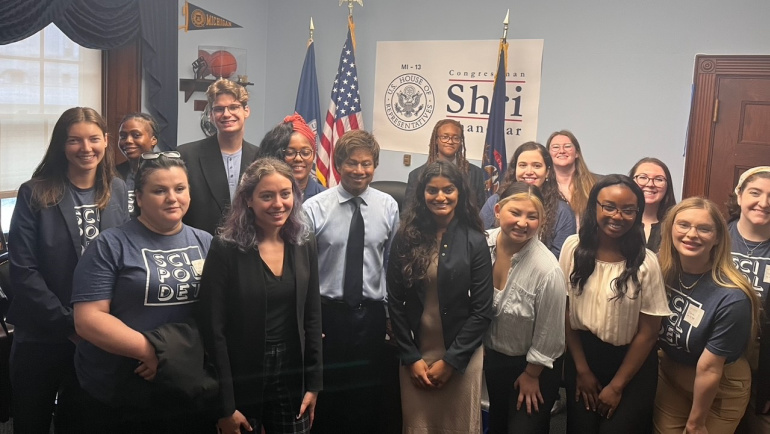
“The highlight of the trip was witnessing SciPol-Detroit members from various academic levels — undergraduate, graduate, postdoc and medical students —passionately advocate for science, health equity and environmental justice — causes close to our hearts,” Dwyer said.
“As scientists and healthcare professionals, we may not always witness the direct impact of our work on communities. However, seeing the positive change we can bring about through our expertise reignites my passion for science. It's empowering to know that as scientists, we can go beyond the lab bench and make a real difference for our communities.”
SciPol-Detroit vice president Breanna Friday, who will become the group’s president during the next school year, went on the trip to Washington, D.C., last year and said she felt more prepared this time.
"I will always remember Rep. Debbie Dingell’s senior staffer telling me that she was grateful for our group bringing the Environmental Justice for All Act to her attention so that she could speak to the congresswoman about co-sponsoring the bill again in this congress,” Friday said.
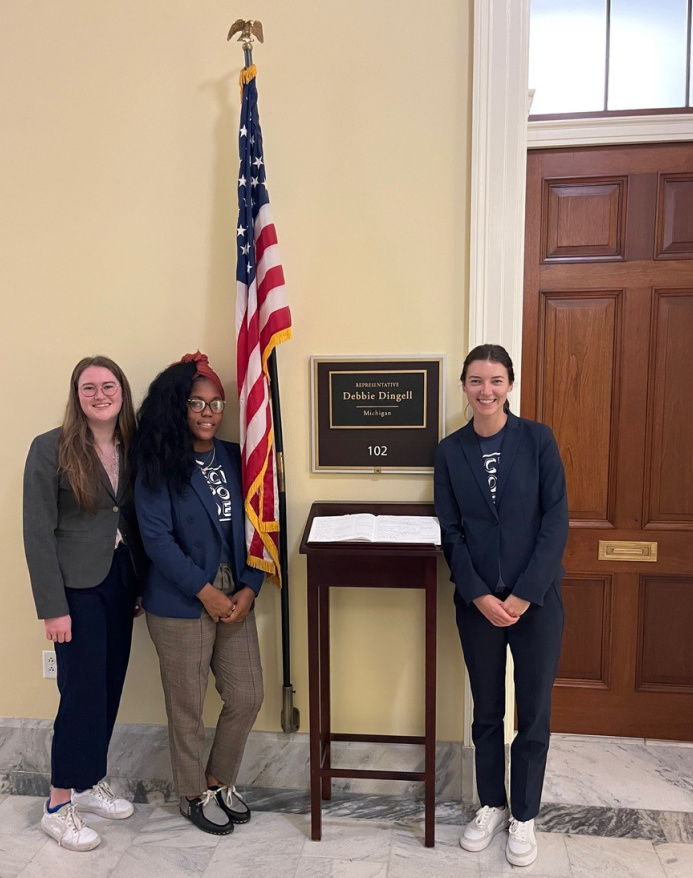
"A lot of our members shared that the trip left them feeling inspired and accomplished. I think that many of us felt like this trip was an opportunity to take action and speak up about issues that were frustrating us over the past year,” Friday added. “There’s a particularly rewarding and invigorating sense of accomplishment that settles in after a trip like this. It’s a wonderful reminder that the science we all are a part of matters far outside of our laboratories.”
For Dwyer, as the outgoing SciPol-Detroit president, the trip inspired her to keep working towards the group’s goals.
“Mobilizing scientists and our communities to support bills and policies that invest in our communities holds immense power,” Dwyer said. "Personally, I left the experience inspired to continue bridging the gap between science and policy, encouraging more scientists and students within STEM to use their voices for a better future.”
SciPol-Detroit used a collaborative process to pick what they wanted to advocate for during the trip and even broke into groups while they were in Washington, D.C., so they could meet with more lawmakers.
"It was a collaborative effort,” Dwyer said. “The SciPol-Detroit executive board called for members interested in participating in an 'Advocacy on the Hill' day(s), urging them to identify bills in Congress they were passionate about and could serve as experts for.
“One standout experience during this year's trip to D.C. was our meeting with Dr. Michael Warren from the U.S. Department of Health and Human Services,” Dwyer added. "A select group of SciPol-Detroit members engaged with Dr. Warren, the associate administrator of the maternal and child health bureau, and his colleague to address the crucial issue of promoting equitable health care for all mothers and infants, regardless of race, socioeconomic status or ethnicity. We gained valuable insights from Dr. Warren about the current strategies of HHS in tackling the healthcare disparities faced by predominantly Black and brown communities. This, in turn, informed our subsequent discussions with lawmakers regarding our advocacy for the Black Maternal Healthcare 'Momnibus' Act.”
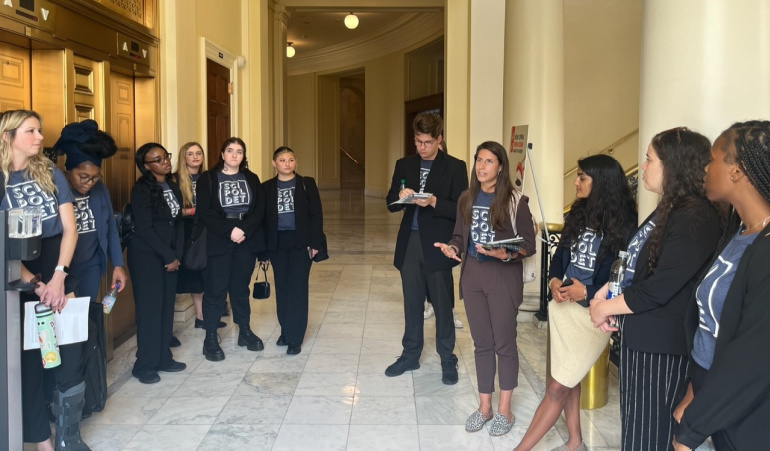 SciPol-Detroit worked closely with Wayne State Director of Federal Affairs Doug Messana both to prepare for the trip and during the trip. Messana provided mentorship and led the group around Capitol Hill.
SciPol-Detroit worked closely with Wayne State Director of Federal Affairs Doug Messana both to prepare for the trip and during the trip. Messana provided mentorship and led the group around Capitol Hill.
“This year was also a different experience from last year because of Doug Messana, who just started at Wayne State before our trip,” Marusak said. "Doug was so kind, helpful and accommodating, and gave our students incredibly helpful tips and feedback. Doug jumped at the opportunity and really made this trip a success and a once-in-a-lifetime experience for students. He spoke about careers in policy, how not everyone’s path is straight and the importance of following your passions.
“He had different experiences from James Williams, who was the former director, so it was really nice for students to get different perspectives on how to best talk to lawmakers.”
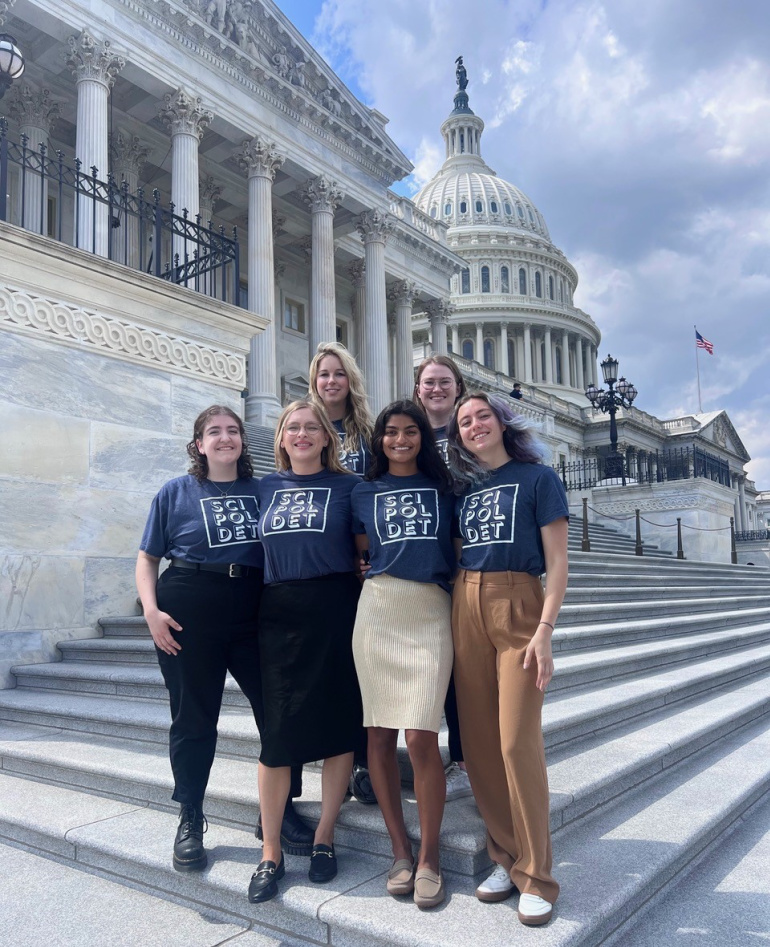 Dwyer said she enjoyed working with Messana.
Dwyer said she enjoyed working with Messana.
“Messana played a pivotal role in preparing our members for their D.C. advocacy trip,” Dwyer said. “Before departing, SciPol-Detroit organized training seminars and practice sessions. The E-board and Doug guided members in researching Congressional bills, gathering scientifically supported evidence and rehearsing their talking points ahead of meetings with lawmakers.”
Marusak said the feedback from students was incredibly positive and she’s confident the group will continue to build on the success of the trip.
“I asked students what their favorite meetings or highlights of the trip were. Many reported that meeting the lawmakers directly, like our meet-and-greet with Sen. Gary Peters and hallway huddle with Rep. Rashida Tlaib, was so inspiring, and these congresspeople and their staffers were so down to earth,” Marusak said. “Lawmakers also appreciate the opportunity to hear ‘thank you’ every once in a while, which we were able to do with co-sponsors or supporters of the bills we advocated for. I’m sure they don’t hear ‘thank you’ enough. One staff member was aligned with our issues but wasn’t aware that the bill had been brought to the floor, so students were successful at gaining a new co-sponsor for a bill.
“Others reported that meeting with the offices of lawmakers who publicly disagreed with the issues we were advocating for was their favorite,” Marusak added. “This was an opportunity for them to possibly make a difference. All of those meetings were very respectful and considerate, and we were able to offer our group as resources despite not completely agreeing.”
Marusak also noted that this trip was made possible by generous donations from the WSU Office of Government and Community Affairs, the WSU Office of the President, and microgrants from the National Science Policy Network and Union of Concerned Scientists.
